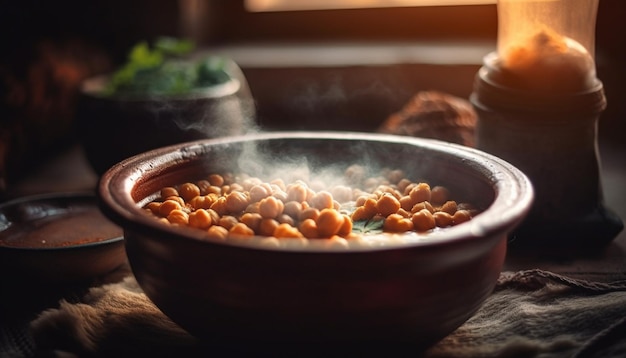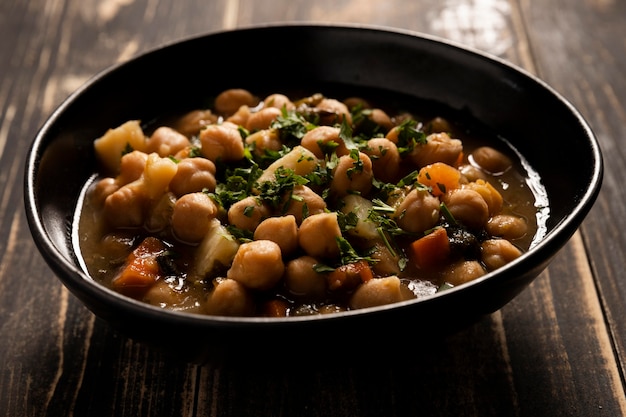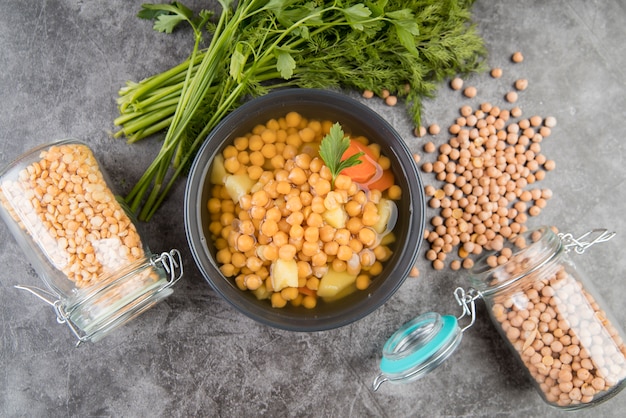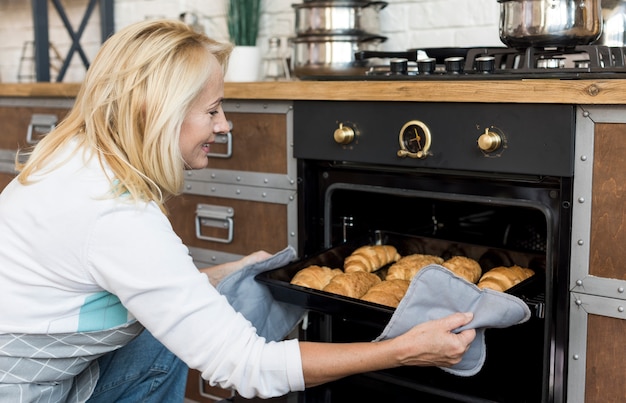Let's be honest, you're staring at a can of chickpeas in the supermarket aisle, and a nagging question pops up: "Do I really need to cook these things from scratch?" You're not alone. For years, I was convinced dried chickpeas were the only way to go. They felt "fresher," more authentic somehow. But then I discovered the magic of canned chickpeas, and my culinary world turned upside down.
This article is your friendly guide to navigating the chickpea jungle, whether you're a seasoned chef or just starting to dabble in the kitchen. We'll dive deep into the differences between canned and dried chickpeas, weigh the pros and cons of each, and even tackle some common cooking questions. Get ready to learn some new tricks and maybe even uncover a newfound love for this humble legume.
(Part 1) The Great Chickpea Debate: Canned vs. Dried

The age-old question, right? Canned or dried? Both have their place, and ultimately, your decision boils down to personal preference and, let's be real, how much time you're willing to invest.
Canned Chickpeas: The Quick and Easy Option
Canned chickpeas are the ultimate shortcut. They're ready to go straight out of the can, no soaking or cooking required. Talk about a time-saver! They're also incredibly versatile, perfect for everything from salads and curries to dips and even veggie burgers.
- The Pros:
- Lightning-Fast: No soaking, no cooking, just drain and use. This is a lifesaver when you're pressed for time.
- Always Ready: Keep a few cans in your pantry, and you'll always have a chickpea-powered meal ready to go.
- budget-friendly: Canned chickpeas are usually a steal, especially when you consider the cost of water and electricity for cooking.
- The Cons:
- Sodium Alert: Canned chickpeas can be high in sodium. Give them a good rinse before using to reduce the salt content.
- Flavor Factor: While perfectly fine, canned chickpeas might not have the same intense, earthy flavor as cooked dried ones. Don't worry, you can always jazz them up with spices and flavourings.
Dried Chickpeas: For the Flavor Connoisseur
Dried chickpeas are the flavourful heroes. They have a deeper, richer flavour than their canned counterparts, a blank canvas ready to absorb the flavours of your dish. But they require a bit more effort - soaking them overnight and then cooking them for an hour or so.
- The Pros:
- Flavor Explosion: Dried chickpeas offer a more intense, nutty flavor that truly shines in your recipes, especially in dishes like hummus where the chickpeas take center stage.
- Sodium Control: No added salt means you control the sodium content to your liking.
- Nutrient Powerhouse: Dried chickpeas are naturally packed with fiber and protein, making them a healthy choice for any meal.
- The Cons:
- Time Commitment: Soaking and cooking takes time, so you'll need to plan ahead. It's not the best choice for a last-minute dinner.
- Extra Steps: soaking chickpeas in the sink overnight is not for everyone. But hey, it's part of the process!
(Part 2) The Ultimate Chickpea Showdown

Let's pit these two contenders against each other and see how they measure up in a few key categories:
Taste
Dried chickpeas win this round hands down. Their earthy, intense flavor is perfect for recipes where you want the chickpeas to be the star. However, canned chickpeas can still be incredibly delicious, especially if you use them in dishes with bold flavors and strong spices.
Texture
It's a tie! Both canned and dried chickpeas can be cooked to a soft and creamy texture, perfect for hummus, soups, and stews. But if you prefer a firmer texture, you can shorten the cooking time for dried chickpeas. Canned chickpeas, on the other hand, usually have a softer texture from the canning process.
Convenience
Canned chickpeas take the prize here. They're ready to go in minutes, making them the perfect choice for busy weeknights or when you need a quick and easy meal. Dried chickpeas require more planning and effort, but the flavor payoff can be worth it.
Cost
Canned chickpeas generally win in terms of immediate cost. However, dried chickpeas can be more affordable in the long run if you factor in the cost of water and electricity for soaking and cooking.
(Part 3) Beyond the Basics: Cooking with Chickpeas

Now, let's get into the fun stuff - using chickpeas in your cooking! This versatile legume can be used in countless ways, from classic dishes like hummus to unexpected twists like chickpea flour pasta.
The Classic: Hummus
No chickpea guide would be complete without a shout-out to hummus. This creamy dip is a staple in many kitchens, perfect for dipping pita bread, crudités, or even just eating straight from the bowl.
Tip: For a smoother texture, use a food processor to blend your hummus until it's silky smooth.
The Versatile: Salads
Chickpeas are a salad superstar. They add a protein and fiber boost and offer a nice textural contrast to other ingredients. Imagine salads with chickpeas, feta, roasted veggies, and a tangy vinaigrette - pure deliciousness.
Tip: Roast your chickpeas for extra flavor and a crispy texture. Just toss them with olive oil, salt, and pepper, spread them on a baking sheet, and roast at 400°F (200°C) for 20-25 minutes.
The Unexpected: Chickpea Flour
Chickpea flour, also known as besan, is a versatile ingredient that can be used to make everything from pancakes and flatbreads to savory snacks and even pasta. It's a gluten-free alternative for those with dietary restrictions.
Tip: Try making chickpea flour pancakes for a healthy and flavorful breakfast or snack.
The Flavorful: Curries and Stews
Chickpeas are a key ingredient in curries and stews around the world. They add a creamy texture and nutty flavor, and they soak up all the delicious spices in your dish.
Tip: Add chickpeas to your favorite curry or stew for added protein and a hearty texture.
(Part 4) Mastering the Art of Soaking and Cooking Dried Chickpeas
Ready to take the plunge and cook dried chickpeas? Here's a step-by-step guide to help you along the way:
Soaking
Soaking dried chickpeas overnight helps them soften and cook more evenly. Here's how to do it:
- Rinse the chickpeas thoroughly in a colander.
- Transfer them to a large bowl and cover them with plenty of cold water.
- Add a pinch of salt (optional) to the water. This can help make the chickpeas more tender.
- Cover the bowl with plastic wrap and let the chickpeas soak in the refrigerator overnight (for at least 8 hours).
Quick Soaking Method: You can also use the quick soaking method, where you boil the chickpeas for 2 minutes, then drain and cover them with fresh water for an hour. This method is faster, but it might reduce the nutritional content slightly.
Cooking
Once your chickpeas are soaked, you're ready to cook them. Here's the breakdown:
- Drain the chickpeas and transfer them to a large pot.
- Cover the chickpeas with fresh water, making sure the water level is about 2 inches above the chickpeas.
- Bring the water to a boil, then reduce the heat to a simmer.
- Simmer the chickpeas, partially covered, for about 1 hour, or until they're tender but not mushy.
- Taste a chickpea to check for doneness. If it's still too firm, simmer for another 15-20 minutes.
- Once the chickpeas are cooked, drain them and use them in your favorite recipe.
Tip: If you're cooking dried chickpeas for a recipe that requires them to hold their shape, like a salad, don't overcook them. Aim for a slightly firmer texture.
(Part 5) Chickpea Storage: How to Keep Them Fresh
You've got your chickpeas ready to go, but how do you make sure they stay fresh? Here's the lowdown on storage:
Storing Canned Chickpeas
Once you've opened a can of chickpeas, transfer them to an airtight container and store them in the refrigerator. They'll last for 3-4 days.
Storing Dried Chickpeas
Dried chickpeas can be stored in an airtight container in a cool, dry place for up to a year.
Storing Cooked Chickpeas
Cooked chickpeas can be stored in an airtight container in the refrigerator for up to 3-4 days. You can also freeze them for up to 3 months. To freeze cooked chickpeas, simply drain them well and spread them out on a baking sheet. Once they're frozen solid, you can transfer them to a freezer-safe bag.
Tip: To use frozen chickpeas, thaw them overnight in the refrigerator or quickly in a microwave.
(Part 6) The Chickpea Beyond: Exploring Other Legumes
Now that you're a chickpea pro, you might be curious about other legumes. Here are a few of my personal favorites:
- Lentils: These tiny powerhouses are packed with protein and fiber. They come in various colours and sizes, each with its own unique flavor and texture. Try red lentils for soups and stews, green lentils for salads, and brown lentils for hearty dishes.
- black beans: These beans are a staple in many cuisines, incredibly versatile, and a great source of protein. They're delicious in soups, stews, salads, and dips.
- kidney beans: These beans have a distinctive shape and a slightly sweet flavor. They're often used in chili, salads, and dips.
- Edamame: These soybeans are a healthy and delicious snack. They can be eaten raw, steamed, or roasted.
(Part 7) Chickpea Mishaps: How to Avoid Them
We all have cooking mishaps, even the most experienced chefs. Here are a few common chickpea mistakes and how to avoid them:
Overcooked Chickpeas
Overcooked chickpeas become mushy and lose their texture. To avoid this, check for doneness regularly and cook them for a shorter time if you prefer a firmer texture.
Undercooked Chickpeas
Undercooked chickpeas will be hard and crunchy. To avoid this, ensure you soak them properly and cook them for the appropriate amount of time.
Bloating and Gas
Chickpeas, like other legumes, can cause bloating and gas. To reduce these effects, soak them overnight in fresh water and rinse them thoroughly before cooking. You can also add digestive enzymes to your meals.
(Part 8) FAQs: Your Chickpea Queries Answered
Let's tackle some of the most common questions people have about chickpeas:
1. Are chickpeas good for you?
Absolutely! Chickpeas are a nutritional powerhouse, packed with protein, fiber, vitamins, and minerals. They're also low in calories and fat. They're a great source of iron, which is important for red blood cell production, and folate, which is essential for cell growth and development.
2. How long do chickpeas last in the refrigerator?
Canned chickpeas can last in the refrigerator for 3-4 days after opening. Cooked chickpeas can also last for 3-4 days in the refrigerator.
3. Can I freeze chickpeas?
Yes, you can freeze cooked chickpeas. To freeze them, spread them out on a baking sheet and freeze them until solid. Once they're frozen solid, you can transfer them to a freezer-safe bag and store them for up to 3 months.
4. Can I use canned chickpeas for hummus?
Absolutely! Canned chickpeas are perfect for hummus. They're already cooked and ready to use, making them a convenient option. Just remember to rinse them thoroughly to remove any excess salt.
5. What are the best ways to add flavor to chickpeas?
There are endless ways to add flavor to chickpeas. You can use spices like cumin, coriander, turmeric, and paprika. You can also add herbs like parsley, cilantro, and mint. For a more tangy flavor, try lemon juice or vinegar. You can even roast chickpeas with olive oil, salt, and pepper for a delicious and crispy snack.
(Part 9) The Last Word: Embrace the Chickpea!
So, there you have it - your comprehensive guide to the world of chickpeas. Whether you're a seasoned cook or just starting out, I hope this article has given you the confidence to experiment with this versatile legume. From classic hummus to unexpected chickpea flour pasta, there's a world of culinary possibilities waiting to be explored. Go forth and embrace the chickpea!
Everyone is watching

Prime Rib Roast Cooking Time Chart: Per Pound Guide
Cooking TipsPrime rib roast. Just the name conjures images of lavish dinners, crackling fires, and hearty laughter. It’s ...

How Long to Bake Potatoes in the Oven (Perfect Every Time)
Cooking TipsBaked potatoes are a staple in my kitchen. They're incredibly versatile, delicious, and surprisingly easy to m...

Perfect Rice Every Time: The Ultimate Guide to Cooking Rice
Cooking TipsAs a self-proclaimed foodie, I've always been a bit obsessed with rice. It's the foundation of countless cuisi...

The Ultimate Guide to Cooking Asparagus: Tips, Techniques, and Recipes
Cooking TipsAsparagus. The mere mention of this spring delicacy conjures up images of vibrant green spears, crisp and burs...

Ultimate Guide to Cooking the Perfect Thanksgiving Turkey
Cooking TipsThanksgiving. Just the word conjures up images of overflowing tables laden with delicious food, the scent of r...
